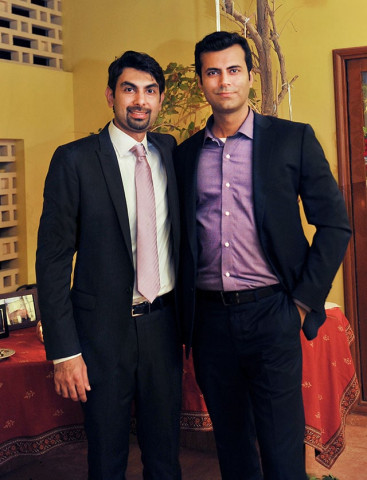Tribune interviews Bag a Bagel founders
Founders talk about the challenges and mistakes faced at their five-year-old company Bag a Bagel

Bag a Bagel founders Ahmed Sohail and Abbas Hussain. PHOTO: BABAR KHAN JAVED
Five years later, Bag a Bagel is one of the most sought out brands for schools and colleges, known for its fresh taste, low preservatives and affordable price. I reached out to the founders for a SWOT-centric interview regarding the journey thus far.
Read: Foodpanda Pakistan grows 100% since August 2014
Let’s start from the beginning. How did you invest the initial capital and acquire customers?
We used the initial capital to create the brand manual, like packaging and artwork, and piloted 50 bags at Agha's, of which all sold out. So for the retail side, we added on Naheed's, Paradise Store, EBCO and a home delivery option. To optimize on our capacity, we secured unbranded deals with Espresso and N'eco's Natural Store and Cafe.
Why do you bother including ingredients, nutrition details and expiration date on the packaging?
Our target group is conscious about what they eat. Our brand looks like a franchise. As the product was new in this market, we wanted the packaging to be as informative as possible so that customers were aware of the product’s production and expiration details before purchase, something that has never been a practice in Pakistan. We wanted to be the first ones to bring that change.
Read: 'Delivery Chacha' will deliver anything, anywhere
In the five years you've spent growing the business, what has been the primary challenge?
The existence and re-orders from repeat customers tells us that there are a brand awareness issues rather than a product quality ones. We've faced issues on the human resource end as well, particularly with ensuring our standard operating procedures and ethics are followed. As a niche product, bagels need a good marketing campaign, which in turn needs the sort of funding that is out of our reach. That said, word of mouth from loyal customers has done wonders. The only product centric problem we face is that the market is used to long lasting products, and our reluctance to use preservatives cuts down shelf life to two days. Two external factors outside of our control are the unpredictable strikes that halt delivery and the corrupt traffic policemen who stop our riders and take sandwiches for themselves.
Read: The new 'Chai Masters'
At the time this started, neither of you had direct or indirect exposure into HoReCa or consumer goods. Can you share some examples of being burned?
Inexperience and naivety have burned us twice. We had a kiosk at a major mall-cinema in Karachi with which we had a verbal agreement that no one else would be serving smoothies and juice in the mall. The management then launched their own service a few days after our product were a success and did so at half price. We were naive and were misled by industry giants but in the end it was lack of experience on our part for not having a written agreement, it’s a cruel business world out there in any industry and we don’t want to blame anyone for outsmarting us. Everyone in the market supported us from day one for bringing something new in the market. Mariam Bilgrami from Peace Niche was the first one to send her love our way via email.
Read: How the E-Lite corporation broke the tobacco category
With regards to your business, if you could say something to your 2010 versions, what would you say?
We were too prudent and risk averse. We waited too long to test the concept and didn’t respond to market feedback fast enough. We would advise our past variations (and anyone else entering the space) to go all out with the investment and create an experience based outlet.
Read: Online music service Patari's founders confident of success
On that note, what would you advise first time food business owners about what they should do in the first 100 days?
The first 100 days varies for everyone, so let us start by advising that they should speak to someone with the experience. You can always cut corners but its best to get the expert to do so. You might see 10 problems, but actually face 20 problems. To a layperson, this business seems very lucrative and it is, but it’s so tough to survive that even well-established and experienced entrepreneurs would need consulting at times. It also requires at least 100 hours a week so one should think twice before jumping in this business. It’s all about using the right resources, respect and right compensation for your employees; the entire business is dependent on your employee satisfaction more than customer satisfaction. Satisfied employee would take ownership, maintain high quality and give more than 100%.
Read: Tripda aims to 'bring trust and reputation back' to carpooling



















COMMENTS
Comments are moderated and generally will be posted if they are on-topic and not abusive.
For more information, please see our Comments FAQ